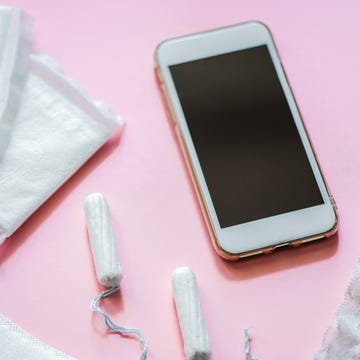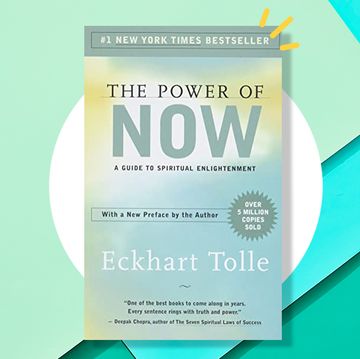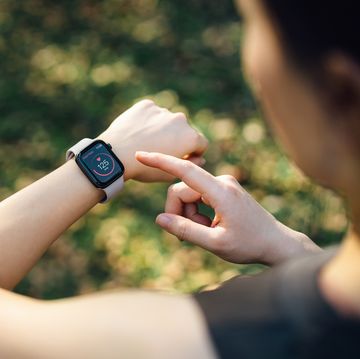Huge understatement alert* The past two and a half years have been hard on mental health. "There's almost this second pandemic where people feel lonely, isolated, and disconnected,” says Dr. Sarah Gupta, a San Francisco-based psychiatrist and medical writer at GoodRx.
So many factors are closely intertwined with our mental health, and just about all of them have taken a hit thanks to the COVID era. While many of these things are out of our control, as we continue to crawl back to a sense of normalcy, it's important to address the habits we can actually change.
Here, Dr. Gupta outlines a few of those less-obvious factors and shares easy tips to make sure you're doing what you can to protect your emotional wellness.
Your Posture
Anyone who's been WFH knows the temptation of moving to the couch around 3 p.m., but hunching over your laptop can do a number on your mood. (Commuting to somewhere other than your living room? Odds are this one still applies to you.)
"Many people don't realize that their body posture actually sends information back to their brain," explains Dr. Gupta. This 2017 study published in Cognition and Emotion backs that up, finding that people sitting in a stooped posture struggled more to recover from a negative mood than those sitting up straight.
Dr. Gupta's Advice
Set a reminder or alarm on your phone every hour to straighten up your posture. When it goes off, make sure your shoulders are over your hips and your head is in a neutral position. "Sit back, sit up, take a deep breath all the way down to your diaphragm, and just let your body feel that different posture," says Dr. Gupta. "If you're feeling anxious, remember that you have this tool."
Your Friends
In 2022, we're pledging to cherish our friends, for many reasons. And high on the list is our mental health. "It's not just about the pride of having friends or knowing that you have a community—human connections actually boost feel-good neurotransmitters in your brain," Dr. Gupta says.
What's more: The number of friends you have isn't important (we asked). The key is to surround yourself with people around whom you can be your most authentic self.
Dr. Gupta's Advice
Be honest with yourself about how much time you need to spend with your friends to feel fulfilled, refreshed, and empowered, and then make it happen—even if it's just a catch-up dinner once a month, it makes a difference.
Wanting to widen your circle? Dr. Gupta recommends trying something new. "Taking a class, joining a Zoom support group, volunteering, or becoming a member at a local museum or garden can help you expand your world and open the doors for new connections and new friendships," she says. (Here are nine more ideas.)
Your Laugh
Spending hours binging your favorite show often gets a bad rap, but if it's making you laugh, you can consider it at least a partial win (bonus points if you do it with a friend).
"Smiling and laughing sends messages back to your brain that, 'Hey everything's okay. I can rest and relax. Life is good,'" explains Dr. Gupta. "There's evidence that being in that rested and relaxed state is protective against anxiety, depression, and stress."
Specifically, people who laughed frequently reported feeling less overwhelmed during stressful life situations compared to those who laughed less often, according to this 2020 study published in PLOS One.
Dr. Gupta's Advice
Make a goal of laughing once a day (that's a self-improvement challenge we can stand behind). Queue up your favorite show, call a funny friend, scroll through your favorite meme account—anything that adds a touch of lightness to your day. (Check out these five health benefits of laughter.)
Your Water Intake
Social media may be on to something with the emotional support water bottle—drinking enough water is key for both physical and mental health.
"When you don't drink enough water and tiptoe into mild dehydration, your body sounds the alarm that you're in a life-threatening situation and starts kicking up those stress hormones—especially cortisol," Dr. Gupta says.
That's not a good place to be in regularly, as spiked cortisol is connected to anxiety, depression, and mood disorders, she says.
Dr. Gupta's Advice
"If you're feeling thirsty or overwhelmed, try drinking a nice cold glass of water," Dr. Gupta says. "And if you are someone who likes more structure, use alarms or trackers to remind yourself that drinking water is a part of your self-care." (Here's how to find out how much you should be drinking).
Your Access to Nature
"Our ancestral brain controls a lot of our stress response," says Dr. Gupta. We're hardwired to need time in nature. "Human beings evolved to prefer environments where we had fresh water, sunlight, and nature because those provided us with the resources we needed to stay alive," she says. "But nowadays, nature doesn't just allow us to survive, it helps us to thrive."
Spending even small bursts of time in nature—yes, you can count the local park that's become your gym, social meet-up spot, and self-care oasis the past two and a half years—can greatly benefit your mental health. A 2019 Frontiers in Psychology study found that spending just 20 minutes outside significantly lowered stress hormone levels.
Dr. Gupta's Advice
Get outdoors as much as possible. And so you get the perk on those days when you're stuck inside, bring nature in by putting a plant on your desk.
For more advice from Dr. Gupta, as well as other doctors, pharmacists, and healthcare experts, head to GoodRx Health.
Emily Shiffer is a former digital web producer for Men’s Health and Prevention, and is currently a freelancer writer specializing in health, weight loss, and fitness. She is currently based in Pennsylvania and loves all things antiques, cilantro, and American history.













